By M. P. Hartzell (Gettysburg 1939)
Back to History Articles page
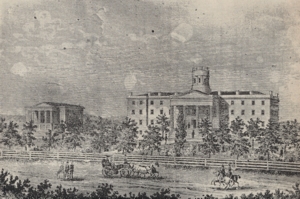 GETTYSBURG COLLEGE AT TIME OF FOUNDING OF XI CHAPTER IN 1858 – Chartered in 1832 as Pennsylvania College to prepare for the Lutheran Theological Seminary, the name of Xi Chapter's sheltering institution was changed to Gettysburg College in 1921. (The roster of Xi, for example, in the 1913 Fiji catalogue of membership is listed in the "P" sequence.) The present enrollment is approximately 1,300 students, of whom one-third are women (first admitted in 1935).
GETTYSBURG COLLEGE AT TIME OF FOUNDING OF XI CHAPTER IN 1858 – Chartered in 1832 as Pennsylvania College to prepare for the Lutheran Theological Seminary, the name of Xi Chapter's sheltering institution was changed to Gettysburg College in 1921. (The roster of Xi, for example, in the 1913 Fiji catalogue of membership is listed in the "P" sequence.) The present enrollment is approximately 1,300 students, of whom one-third are women (first admitted in 1935).
The beginning of Xi Chapter was on the evening of March 31, 1858, in a private room of the plush Hotel McClellan in the center of Gettysburg, with Thomas B. Burrowes, 1858; John E. George, 1860; Abraham H. Groh, 1860; Jacob Kline, 1860, and James H. Moore, 1859, as its charter members. The Legate was Francis J. Collier (Jefferson 1858). The new chapter was merely days old when it held its first initiation and bound into membership Washington V. Gotwald, 1860, and Matthias H. Richards, 1860.
Interesting and moving stories are related of fraternity affiliations during the War Between the States, of divisions within chapters, of encounters on the battlefields, of reciprocally merciful and compassionate acts shown to the captured or the wounded who wore the black diamond.
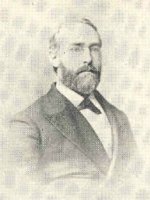 FRANCIS J. COLLIER – Fourteenth link in the chapter chain of Phi Gamma Delta, Xi Chapter was installed on March 31,1858. The Legate was Francis J. Collier (Jefferson 1858), a clergyman who died in 1918.
FRANCIS J. COLLIER – Fourteenth link in the chapter chain of Phi Gamma Delta, Xi Chapter was installed on March 31,1858. The Legate was Francis J. Collier (Jefferson 1858), a clergyman who died in 1918.
Xi has its own human interest story about the Battle of Gettysburg. One of the wounded Confederates was hospitalized in one of the college buildings. He was a member of Phi Gamma Delta. The men of Xi visited him and later reported to the Grand Chapter: "He is an ardent Rebel, but even a more ardent Delta – and we gave him a catalogue of membership."
At least three members of Xi went off to the battlefields before 1863; the majority of the members waited for a battlefield to come to them. Calisthenics and drills were a voluntary part of student activity from the inception of the Confederate march northward until June, 1863, when the governor of Pennsylvania issued a plea for militia for the "duration of the emergency." Gettysburg College has always been proud of the fact that a student company was organized and responded at once. Xi may be proud of the fact that elected captain of the company was Frederick Klinefelter, 1862, a student at the Lutheran Seminary in Gettysburg, who had served in the ranks in the summer of 1861. Under him in the company served ten undergraduate Deltas.
The role of the student company in the Battle of Gettysburg was neither decisive nor glorious, but the members were both enthusiastic and intelligent and, because of the familiarity with the terrain around Gettysburg, were able to serve well as sentries and scouts. And be it ever to the credit of the college spirit and, in a proportionate degree, of the fraternity spirit that among the hundreds of men who milled about the New Cumberland camp in reply to the plea for militia and lacked the final impetus to enlist, the Gettysburg College company presented itself en masse, received the honorable title of Company A and by its willingness to be sworn in precipitated the mass enlistment of the hangers-back.
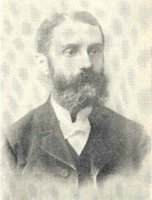 MATTHIAS H. RICHARDS – Xi Chapter's impress on the fraternity will last forever in that one of her sons, Matthias H. Richards (Gettysburg 1860), wrote the words of our famed chorus beginning "When college songs and college lays are faded with their maker's days." It was written during his undergraduate days. Brother Richards was vice-chairman of the 1863 Convention.
MATTHIAS H. RICHARDS – Xi Chapter's impress on the fraternity will last forever in that one of her sons, Matthias H. Richards (Gettysburg 1860), wrote the words of our famed chorus beginning "When college songs and college lays are faded with their maker's days." It was written during his undergraduate days. Brother Richards was vice-chairman of the 1863 Convention.
Fraternities seem by the end of the war to have emerged somewhat from their secretiveness. For three years Xi rented a hall for a gathering place and meeting room. No records remain to indicate where the hall was or why it was abandoned. From 1868 until 1876 we must assume that the chapter reverted to the practice of holding meetings wherever it was possible. For the whole period from the close of the war until 1890 there is little to guide the would-be chapter historian. The early minute books were not preserved and although The PHI GAMMA DELTA began regular publication in 1879, Xi Chapter's collection does not begin until Volume XI.
True, the facts available about Xi for the period are few, but the conclusions that may safely be based on those facts are significant. From June of 1876 until 1890 the chapter rented the top floor of a building that still stands.
The number of initiates and the constancy of the number are impressive and so are the initiates themselves. For loyalty and devotion to the chapter and for service to the national fraternity Xi has not surpassed the men initiated in that unchronicled period. Edward S. Breidenbaugh, '68; Harry L. Stahler, '82; Luther A. Brewer, '83, and Charles H. Huber, '92, were men whose names are indispensable to a history of Phi Gamma Delta at Gettysburg. That men of such achievement and worth as these should be willing all their lives to work for the causes of the fraternity is surely indicative that in their undergraduate days Phi Gamma Delta was for them all that its founders in-tended it to be.
In references to the Gettysburg Chapter, the Editor of The PHI GAMMA DELTA in 1890 and 1891 uses the very flattering words "long known as our banner chapter." To have earned the phrase Xi first must have avoided the pitfalls so eloquently decried in fraternity editorials.
HOUSE IS BUILT IN 1891
The step taken to build a chapter-house between January, 1889, and June, 1891, became a pattern for other chapters of Phi Gamma Delta. T. Alfred Vernon (Yale '75), who had both the interest and the means to devote himself to extensive fraternity work, espoused the chapter-house or lodge as one of his special causes and repeatedly referred to the method and success of Xi in building the second Fiji house. The pattern was simple: appoint a committee; ask the college for a site; write to alumni for funds, write again; seek the advice of interested alumni; write again; choose the plans; build, despite slightly inadequate funds. Two notes about Xi's financial problems were particularly interesting. First, the undergraduate brothers themselves contributed a large portion of the money for the lodge and, second, what deficit showed at the time of the dedication was erased that night at the banquet by the expedient of having the chairman arise and mention that there was a deficit. The alumni present, whether full of food, fraternal spirit, or an awareness of one another's presence, pledged on the spot whatever sum was needed.
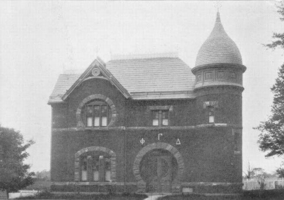 XI'S FIRST HOME – SECOND IN PHI GAMMA DELTA – IN 1891 — Following the lead of the Pennsylvania State Chapter, Xi Chapter in 1891 dedicated this house. The undergraduates did all the excavating and terracing and much of the unskilled labor of actual building. It contained lounging rooms and a meeting hall on the second floor. The handsome present house of Xi stands on this location.
XI'S FIRST HOME – SECOND IN PHI GAMMA DELTA – IN 1891 — Following the lead of the Pennsylvania State Chapter, Xi Chapter in 1891 dedicated this house. The undergraduates did all the excavating and terracing and much of the unskilled labor of actual building. It contained lounging rooms and a meeting hall on the second floor. The handsome present house of Xi stands on this location.
The lodge stood on the location of the present one, close to the Phi Kappa Psi lodge.*
* Phi Kappa Psi was the first fraternity to be established at Gettysburg College – in 1855. Other early arrivals after the founding of Phi Gamma Delta in 1858: Sigma Chi, 1863; Phi Delta Theta, 1875; Alpha Tau Omega, 1882; Sigma Alpha Epsilon, 1883.
The high point of chapter activity during the early 1900s was the 50th anniversary celebration. Commencement week of June, 1908, was chosen as the proper time for the celebration. The college authorities pro-claimed Tuesday, June 9, as Phi Gamma Delta Day at Gettysburg and cooperated with the committee to assure the dignity of the celebration, for a fine program could reflect only honor upon the college. Actually, the Phi Gamma Delta anniversary brought speakers of such eloquence and renown – Newton D. Baker (Johns Hopkins '92, Washington and Lee '94), Archon President of Phi Gamma Delta; Milton H. Valentine, '82, prominent clergyman and editor of the Lutheran Observer, and T. Dimner Beeber, '74, a former judge of the superior court – that the commencement exercises for the year were only dimly remembered.
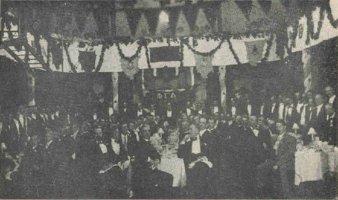 XI'S SEMI-CENTENNIAL BANQUET IN JUNE OF 1908 – Tuesday, June 9, 1908, was proclaimed Phi Gamma Delta Day by Gettysburg College, in observance of Xi Chapter's 50th anniversary. Newton D. Baker (Johns Hopkins '92, Washington and Lee '94), Archon President of the fraternity, was one of the principal speakers. The photograph was taken upon the noteworthy occasion.
XI'S SEMI-CENTENNIAL BANQUET IN JUNE OF 1908 – Tuesday, June 9, 1908, was proclaimed Phi Gamma Delta Day by Gettysburg College, in observance of Xi Chapter's 50th anniversary. Newton D. Baker (Johns Hopkins '92, Washington and Lee '94), Archon President of the fraternity, was one of the principal speakers. The photograph was taken upon the noteworthy occasion.
Perhaps as a result of speaking to the graduates who had observed fraternities on campuses throughout the country, after the anniversary celebration there was a feeling among the undergraduates that the chapter was outgrowing its lodge. Gettysburg at that time had no fraternity houses which offered rooming and boarding facilities to members, but the arrangement was popular at the large universities. With the interested graduates on the spot, a house fund was started to which voluntary contributors pledged to add a specified amount twice a year. There was no incorporation, but the fund was the start of the first Xi House Association. Xi's finances at the time were wonderfully uncomplicated. Ekklesia reports showed year after year for Xi no liabilities, no assets and a cash balance of less than $10.
World War I drew off the members of the upper classes from 1915 to 1918 but the freshman classes were large and because there was no large house dependent on boarding members for meeting mortgage payments, there was no financial need to keep the chapter at its maximum number. The chapter was diligent in corresponding with its 17 men in the armed forces. Fifteen of the 17 undergraduates were enrolled in the college Reserve Officers' Training Corps. John S. Fair, '94, achieved the rank of major-general during the war.
TRUSTEES AID BUILDING PROJECT
The house association by December of 1926 had accumulated in cash and pledges approximately $10,000, two-fifths of the amount the college trustees had fixed as the maximum any group might spend for a fraternity house at Gettysburg. The struggle for permission to build a house had been a long one; the victory was in no small part due to the loyalty of those trustees who were themselves fraternity men, six of them Fijis.
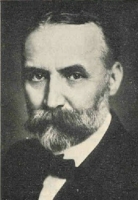 LUTHER A. BREWER – The name of no Xi Fiji is more widely known in Phi Gamma Delta than that of Luther A. Brewer (Gettysburg '83), who served as Archon Treasurer from 1923 until his death in 1933. Another Xi alumnus – Charles F. Fite (Gettysburg '98) – was a Councilor from 1900 to 1902.
LUTHER A. BREWER – The name of no Xi Fiji is more widely known in Phi Gamma Delta than that of Luther A. Brewer (Gettysburg '83), who served as Archon Treasurer from 1923 until his death in 1933. Another Xi alumnus – Charles F. Fite (Gettysburg '98) – was a Councilor from 1900 to 1902.
The money collected up to that crucial date seemed to represent all that could be hoped for from the alumni of Xi and it certainly did represent a staggering amount of hard work and devotion on the part of the house association. Chairman Carl S. Karmany,'02; Dr. Charles Huber, Charles H. Smith,'99; Harry L. Stahler, and Luther A. Brewer had pleaded and exhorted. Brother Brewer was a publisher and had printed convincing brochures. George C. Baum,'93, under the persuasion of the committee, drew the plans of what was needed and wanted and with fresh ammunition the committee pleaded again. To meeting after meeting the committee members had come, from Rochester, Allegheny, Norristown and Cedar Rapids. And from meeting after meeting they had left with the knowledge that it would not be much longer until bricks made the house that still existed only in their minds. In December, 1926, Harry and Luther, or "Daddy," as he was known to the boys, decided that the committee had done as much as it could and that the balance of $15,000 would come from their own pockets. And thereby hangs a tale.
It is a tale of two men – but one lived in Iowa and the other lived in Norristown, Pa., and so it becomes really a tale of one man – and of the devotion and loyalty they felt for their fraternity and their alma mater. Luther Brewer and Harry Stahler were close friends in undergraduate days, both actives during the halcyon period of the early '80s.
Brewer became a journalist in Iowa after graduation and left his job as city editor of a Des Moines newspaper to accept the chair of journalism at Iowa University. He later acquired The Torch Press of Cedar Rapids and became publisher of a city daily. Despite the distance between Iowa and Pennsylvania he was a frequent visitor at Gettysburg and, through these visits to the chapter and his correspondence with friends closer to Gettysburg, was always well-informed of chapter affairs. He traveled extensively both abroad and in the States and his travels most often took him to the site of the Phi Gamma Delta Ekkiesia. To his presses were entrusted the publication of the fraternity history and magazine. In 1923 he assumed the demanding role of Archon Treasurer and still served in that capacity until his death in 1933.
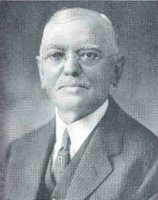 HARRY L. STAHLER — So close was Brother Stahler (Gettysburg '82) to Xi Chapter for years that the campus idiom was to refer to the Fijis as "Harry Stahler's boys." His will left $25,000 to the house corporation.
HARRY L. STAHLER — So close was Brother Stahler (Gettysburg '82) to Xi Chapter for years that the campus idiom was to refer to the Fijis as "Harry Stahler's boys." His will left $25,000 to the house corporation.
Harry L. Stahler was pledged to Phi Gamma Delta while a student at Gettysburg Academy. For love of the fraternal spirit, he has never been surpassed in the chapter. From the turn of the century until his death in 1929 the terms "Fijis" and "Harry Stahler's Boys" were synonymous in Gettysburg. If Gettysburg had not already had Xi Chapter, it is a fairly safe assumption that Harry Stahler would have founded it.
With his older brother, William F. Stahler, '80, who became a prominent Lutheran minister, Harry came to Gettysburg from Norristown, son of a wholesale drug producer. His early years after graduation were spent in the family business, but his life work was the sale and detonation of dynamite for the Hercules Powder Co. His territory took him through northern Maryland and West Virginia and, of course, Gettysburg. He served a term as Section Chief. At that time The PHI GAMMA DELTA praised his enthusiasm and warmth and hazarded the opinion that more undergraduates called Harry by his first name than any other graduate member of the fraternity.
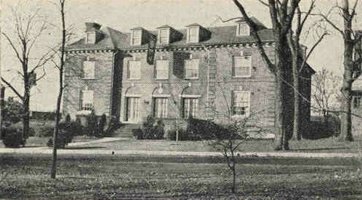 XI'S HOUSE ON BATTLEFIELD CAMPUS – This imposing home of the Gettysburg Chapter was dedicated in 1927. It stands on the site of the original 1891 house – the second to be built in the fraternity.
XI'S HOUSE ON BATTLEFIELD CAMPUS – This imposing home of the Gettysburg Chapter was dedicated in 1927. It stands on the site of the original 1891 house – the second to be built in the fraternity.
The new house was dedicated in June, 1927.
STAHLER'S BEQUEST IS $25,000
In 1929 Harry Stahler died, leaving the chapter $25,000 with which to absolve the debt he and Luther Brewer had underwritten for the construction of the house. In tribute to his memory, the chapter established Stahler Memorial Gardens, converting to a place of beauty the neglected southern edge of the campus known as McCogaughy's Meadows. Dr. Charles Huber demonstrated in this project – as in so many others for the good of the chapter, the fraternity and the college – his vision and practical judgment. In their original beauty the gardens reflected honor to the man they commemorated and the chapter that conceived them.
The morale of the chapter was good throughout the '30s. Xi's men were hospitable and gracious, capable of holding almost any office on campus, and, according to their Section Chief, a "thoroughly likable group." But they were very poor scholastically and never quite in control of their house-management finances. Dr. Thomas L. Cline, Fac., head of the English department, had succeeded Dr. Huber as Legionnaire for the group. Suave and eloquent, Dr. Cline devoted himself to impressing on his charges the importance of their scholarship. He was succeeded as adviser in the late '30s by John S. Rice, '21. Through these two, the other faithful alumni, the national officers to whom Xi's long record of excellence seemed jeopardized and a few remarkably fine chapter scholars, the campaign succeeded. By 1939 Xi held the second-place average among the fraternities on the campus.
The other problem was attacked less directly but just as effectively. In the spring of 1940 a wing was added to the house. If the hoped-for occupant never materialized, the wing would serve as guest room and powder room for the ladies. But the occupant did materialize and the wing has been used in its best possible capacity ever since, that of quarters for a house mother.
WINS BAKER SOCIAL SERVICE CUP
With the dissolution of the two black marks, Xi undertook to reestablish its superiority among the chapters of Phi Gamma Delta. The Baker Social Service Cup was the contemporary equivalent of "banner chapter." And to Xi the Cup came for the chapter's efforts in 1940-41. To qualify for the honor Xi listed the following endeavors: the abolition of swearing in the chapter's house; group attendance at church services and assistance with ushering and choir; entertaining of under-privileged children; collection of clothes for the poor and donations to orphans' homes, foreign students' aid and war relief agencies. A fine scholarship rating, in addition to the local activities, assured the winning of the national trophy.
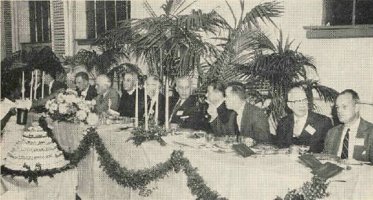 THE HEAD TABLE AT THE CENTENNIAL CELEBRATION OF XI CHAPTER – Several hundred Fijis gathered at a banquet in the Hotel Gettysburg on November 16 to observe Xi's centenary. The Rev. Dr. David A. Menges (Gettysburg 1924), sixth from left, a Lutheran clergyman, was the principal speaker. Samuel B. Shirk (Gettysburg 1937), on Dr. Menges' left, was symposiarch.
THE HEAD TABLE AT THE CENTENNIAL CELEBRATION OF XI CHAPTER – Several hundred Fijis gathered at a banquet in the Hotel Gettysburg on November 16 to observe Xi's centenary. The Rev. Dr. David A. Menges (Gettysburg 1924), sixth from left, a Lutheran clergyman, was the principal speaker. Samuel B. Shirk (Gettysburg 1937), on Dr. Menges' left, was symposiarch.
The Baker Cup was presented at the initiation dinner in March, 1942. A little more than a year later, a handful of Phi Gamma Deltas were all that stood by to cherish the memory of the efforts that had procured it. There remained on the campus enough Fijis to keep alive a functioning chapter, but not enough to occupy the chapter-house. And so for three years Xi Chapter stood outside and looked at what had become, through war-time necessity, the Chi Omega house.
The wartime records of Fijis from every chapter of the country inspire pride and reverence. But as, even though the entire nation was united as never before, one still felt more keenly the sacrifices of family and close friends, so Xi has cherished especially the struggles of its own brother members. In World War II Xi also had an officer, Major-General Charles A. Willoughby, 1914, whose hazardous journey from Corregidor has become a national legend.
And from the annals of the chapter will never be omitted the names of the members who died in the service of their country: Richard N. Long 1937, Howard A. Hall 1939, William F. Muhlenberg 1941, Charles S. Fite 1942, William A. Florsheim 1943, and Ray S. Musselman 1944.
During the postwar years Xi has weathered the changes that have affected the entire college. She has withstood minor crises and relished minor victories and stands as a living memorial to the vision of her founders. On the threshold of her second century she could take no wiser move than to rededicate herself to the principles of the first.
Back to History Articles page